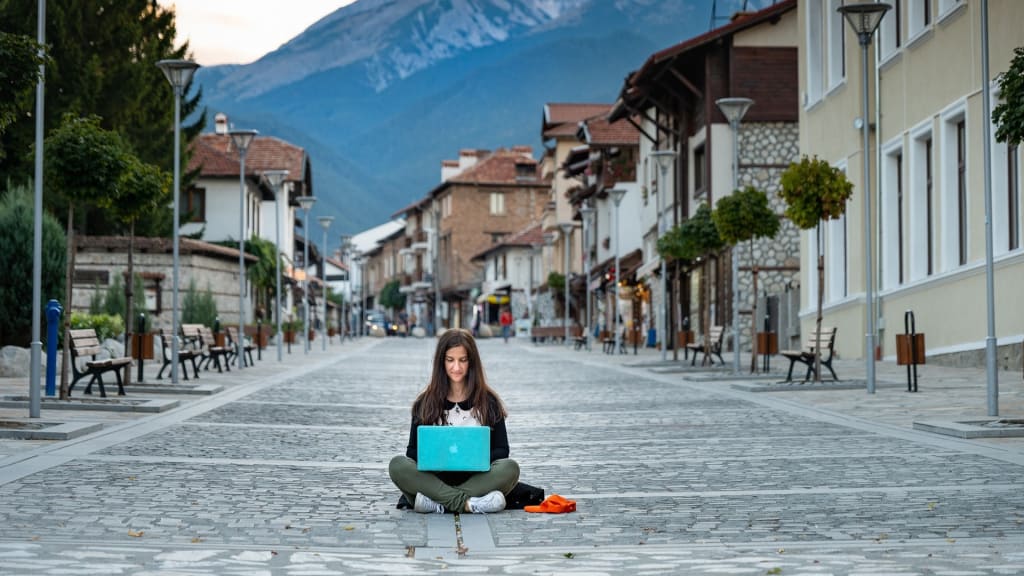Is it possible to work remotely from another country? Find it out!
Is your dream to become a digital nomad and to be able to work from anywhere? If so, here's what you need to consider to work remotely from another country.
5min

What does working remotely mean?
Since COVID-19, many of us have become remote workers. It simply means that you’re working outside of the traditional office environment. Instead you might be working at home, in a co-working space, or on a beach in the Bahamas.
That’s where the phrase ‘digital nomad’ comes in. Digital nomads are a specific type of remote worker. They work whilst traveling the world - something that a lot of us dream of doing. I know I do!
In this guide, I’ll talk about what you need to know to work remotely from another country. There are some technicalities that you’ll need to consider before being able to live your best life.
How to work remotely from another country

Talk to your employer
If you work for a company, the first thing you need to do before hopping on a plane is to ask if you’re allowed. There’s no point jumping into planning if they’re going to say no. (Fingers crossed they don't).
Even if you’re self-employed, it’s good to check if your clients are okay with your services being offered from another country.
COVID has shown employers that their staff can be trusted to work remotely and that almost everything can be done online. But that doesn’t guarantee that they’ll say yes.
There are compliance challenges that companies have to consider when an employee works from a different country. Taxes for example.
Where do you pay taxes when working remotely?
Taxes are often the most confusing and complicated part of working remotely. Different countries have different tax laws!
Most of the time, you’ll still pay taxes to the country that you’re a resident of. For example, if you’re a resident in the UK, but remote working in Spain, you’ll still pay taxes in the UK.
Every country has its own tax residency rules which tell you how long you can stay in their country before having to pay tax to them. That’s why it’s important for you to do your research before remote working from a country.
The EU for example usually considers an individual a tax resident after they have spent six months within their borders.
What visa do you need to work remotely?
Thankfully, the visa part of working remotely is getting easier with the introduction of digital nomad visas. It’s a document that allows someone to legally work remotely in a country outside of their permanent residence.
And the great news is that more and more countries are starting to provide them. Currently, around 50 countries offer digital nomad visas. These include Colombia, Iceland, Georgia, Antigua and Barbuda, Croatia, and more.
You’ll normally have to meet a few conditions such as proof of income, savings, or health insurance. It varies between countries, but obtaining a digital nomad visa usually allows you to stay in the country for 6 months to 1-year.
What if there isn’t a digital nomad visa?
Again, visa rules vary from country to country. In some, you may be allowed to work on a tourist visa, like digital nomads in Mexico. That's as long as you’re not providing work for the country you’re in. Others might have a special visa, like the Digital Nomad Visa for Portugal.
Before picking a country to work remotely in, make sure to check what their visa rules are.
Benefits of working remotely in another country

Now that we’ve got the complicated legal stuff out of the way, let's talk about why remote working is incredible:
You can travel
Working remotely means that you can work from wherever you like (as long as there’s Wi-Fi). That gives you an unbelievable amount of freedom to see the world, discover new cultures, and try new things.
It saves you money
If you choose a country with low costs of living such as Colombia, Thailand, or Albania, you’ll likely be saving more money than if you were at home.
Also, you get to skip the often long and costly commute to work. Instead, your commute can be a stroll to a beach bar to work.
You experience personal growth
Placing yourself in a country with different culture, language, and way of life can be challenging. Especially if you do it alone!
But these challenges, figuring things out by yourself, lead to incredible personal growth and an increase in confidence.
Opportunities to meet new people
One of my favorite things about remote working in another country is that you can meet people from all around the world. There are digital nomad communities everywhere that make it so easy to create connections and friendships.
Downsides of working remotely in another country
The digital nomad life is sold through YouTube and Instagram as "the dream life". It’s definitely not as glamorous and sunny as it looks.
Difficult work-life balance
It can be easy to get carried away with your new incredible surroundings. So many adventures lay waiting on your doorstep, but you still have to work the same hours that you did at home.
Initially, it can be hard to find the right balance between working and getting to experience the place you're in. What’s the point in working remotely abroad if you’re going to sit behind your laptop all day? Similarly, is being in a beautiful place enough to let your work start to slip? You’ll find the balance that works for you!
Lack of stability
This one affects everyone differently. Some people can take changes in their stride. Others like to know where they’re living next week and have a home base.
Working remotely can mean moving around quite regularly depending on visas and rent. If you’re doing this a lot, it can get tiring.
Loneliness
Some places have an amazing digital nomad or traveler community, but some don’t. If you find yourself somewhere that’s hard to meet people, it can get lonely. Especially if you don’t speak the language.
Immerse yourself in the culture by volunteering with Worldpackers

Volunteering with Worldpackers can be a great way to tackle some of the challenges of remote working. You’ll have a base to call home, and it’s likely that you’ll meet some really awesome people also volunteering.
It can be a great way to fully immerse yourself in the local culture and slip into the daily life of that place. Another great perk of volunteering is that you’ll receive free accommodation and potentially meals in return for your skills. That’s even more savings!
Worldpackers have opportunities in over 140 countries. Chances are, wherever you want to work remotely, there will be an exceptional volunteering opportunity. Not sure where to go? Check out the best 22 countries for digital nomads.
If you like these tips, follow Worldpackers social media to keep up with the news: we are on Instagram, Tiktok and YouTube!












ghufran
Feb 03, 2023
hello everyone
Anna
Nov 24, 2023
hi
Anna
Nov 24, 2023
hi poppy
tu minh
Mar 10, 2024
I love bonding with people with different background